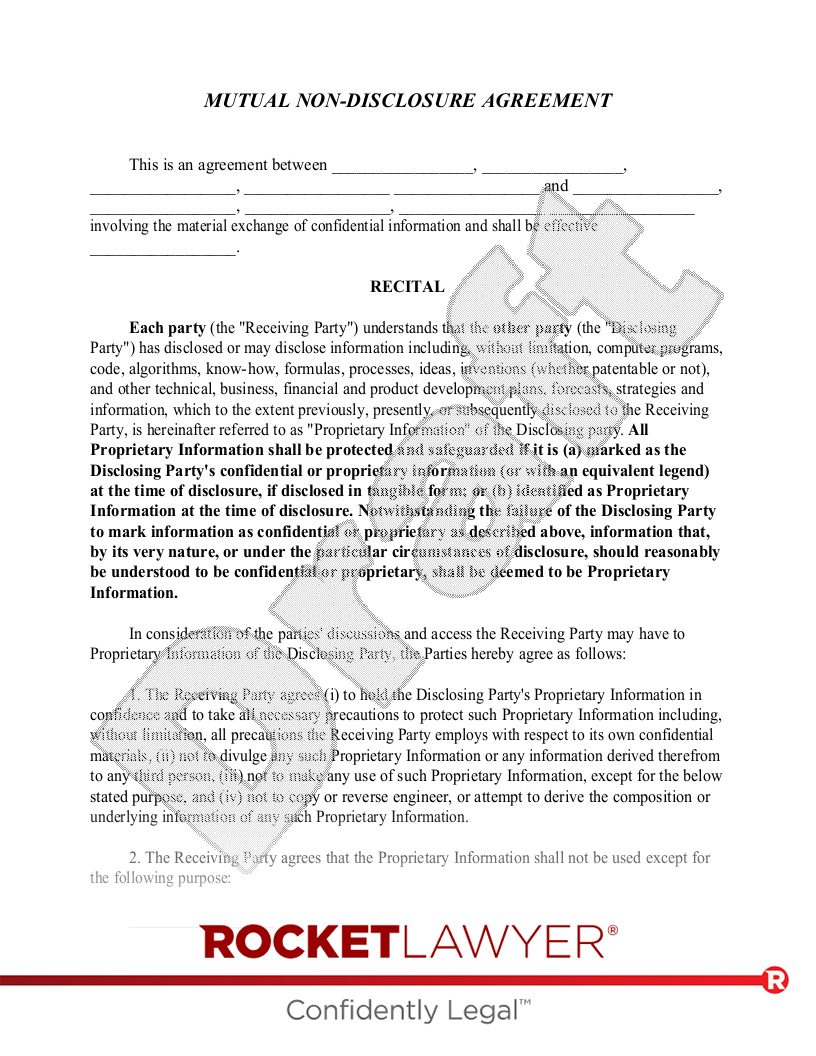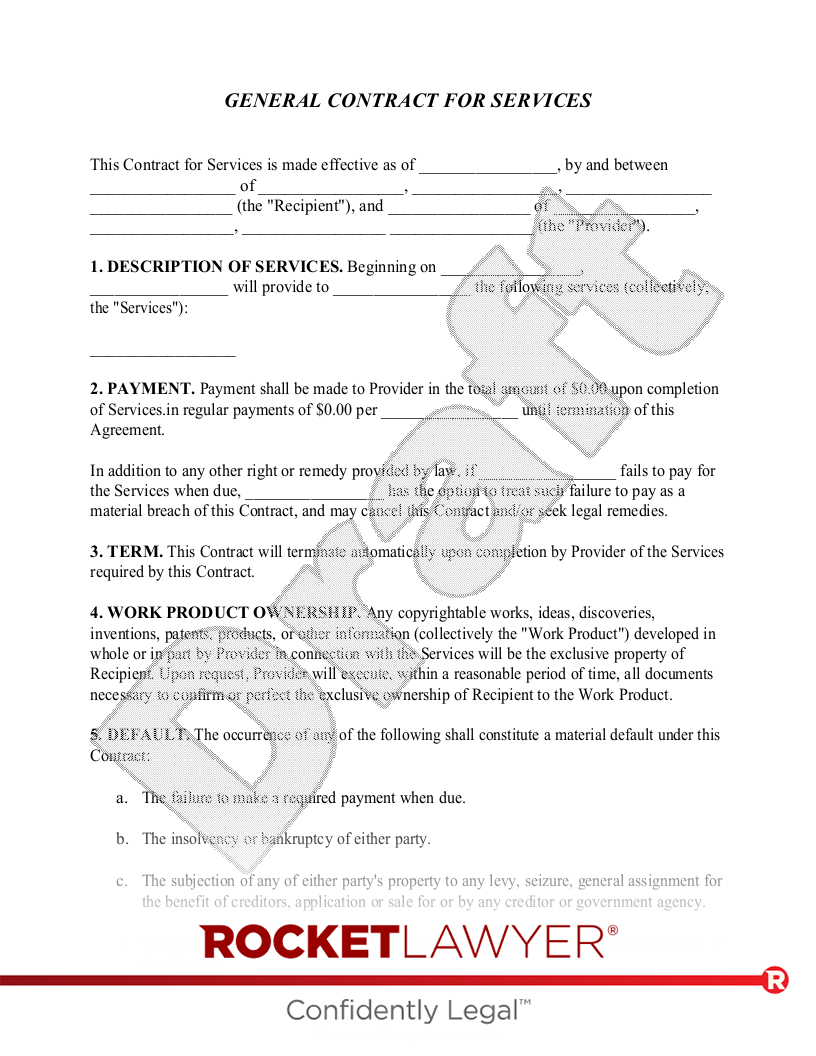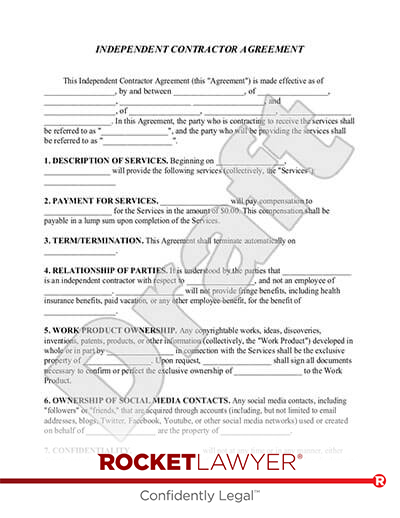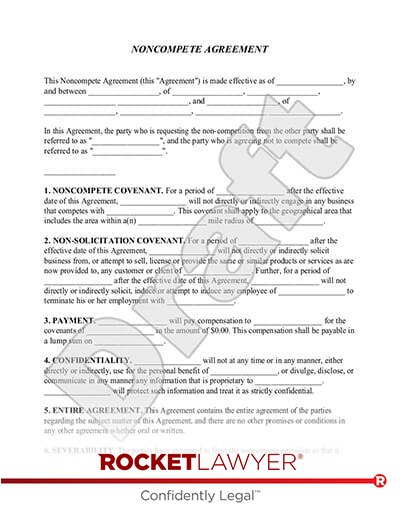Non-Disclosure Agreement


Create Your Document In Just 3 Easy Steps
Build your document
Save, print & share
Sign & make it legal
A Non-Disclosure Agreement (NDA) is a legally enforceable contract that establishes confidentiality between two parties—the owner of protected information and the recipient of that information. By signing an NDA, participants agree to protect confidential information shared with them by the other party. In addition to not divulging or releasing the information without consent, the recipient also agrees not to copy, modify, or make use of the information in any way that is not authorized by the owner.
A Non-Disclosure Agreement (NDA) is a legally enforceable contract that establishes confidentiality between two parties—the owner of protected information and the recipient of that information. By signing an NDA, participants agree to protect confidential information shared with them by the other party. In addition to not divulging or releasing the information without consent, the recipient also agrees not to copy, modify, or make use of the information in any way that is not authorized by the owner.
Build your document
Save, print & share
Sign & make it legal
Protect your company's proprietary information
Hire or be hired with confidence
Share and receive sensitive information
Set clear terms and conditions for any services
A Non-Disclosure Agreement (or "NDA") is an agreement under which a party (the "Recipient") agrees not to disclose proprietary and confidential information ("Confidential Information") that it receives from another party (the "Owner"). This type of agreement may be useful in a variety of circumstances. For example, a company might choose to share information with a web marketing consultant for the purpose of improving its online sales through its website. In such a situation, the company would probably be sharing product and customer information with the marketing consultant and would want to protect this information from disclosure by the consultant to third parties by using a Non-Disclosure Agreement. Non-Disclosure Agreement templates contain a variety of clauses with legal terms that can be confusing. We’ll cover the most common clauses below and explain what they mean.
In a Non-Disclosure Agreement, confidential information is the data or information the parties want to protect. It can be business-related, such as proprietary information (trade secrets) or business financial records. It could also be personal information, such as bank statements or tax returns.
Confidential information can be written or oral and might be received directly or indirectly. The information that an NDA seeks to protect can be very extensive or extremely limited, based on the document’s language.
Examples of confidential information might include:
In the employment context, confidential information is usually internal information about a company. Employers might use a Non-Disclosure Agreement to protect their business practices, such as how they make their products or perform their services. In that situation, even observations are protected, not just communications or documents. However, confidential information is not automatically confidential simply because one party says it is. Instead, confidential information cannot be information already public knowledge or that a party lawfully received from another source. An NDA might also include specific descriptions of data that is not considered confidential information.In some Non-Disclosure Agreements, confidential information must be marked as “confidential” by putting the word on the top of the document in a conspicuous way. However, not every NDA uses this marking method. Some agreements will state that every document or any information received is confidential, so there is no need to mark everything.
Every Non-Disclosure Agreement aims to protect the disclosure of confidential information. Parties cannot share with others the specific confidential information that the NDA seeks to protect. However, sharing might be permitted if the third party that receives the information also agrees to the terms of the Non-Disclosure Agreement.
Once a party receives confidential information under an NDA, they have an affirmative duty to protect that confidential information. That means more than just not sharing the information. They must also take steps to keep the data safe so that other parties cannot access it. In some situations, that can mean ensuring that they have digital protections on computers or keeping confidential information in a locked location.
Protection of confidential information also generally requires that the receiving party notify the providing party if there has been a data breach or any other action that would expose the information to someone that should not have it. Copying, modifying, and methods of disclosure might be addressed as well.
A Non-Disclosure Agreement specifically requires the parties to keep information safe and confidential. If it is shared, there are consequences. Specifically, the sharing party might be legally liable for any damages caused by sharing the information.
In most cases, the party who owns the confidential information can also request an “injunction” from the court. An injunction is a court order that stops a party from taking a specific action. To receive an injunction, the party requesting it must show that they would suffer irreparable harm if the action does not stop.
Consider an example. Imagine an employee signed an NDA as part of their employment. The employee decides to quit and start his own business. He takes a confidential client list from his prior employer. He starts calling those individuals and offering the same services provided by his previous employer at a slightly lower rate—because he knows what those clients were paying for services from his prior employer.
In that situation, the employer can file a legal complaint asking the court to issue an injunction to stop the employee from stealing its clients and violating its NDA. The injunction request would likely be granted because the employer’s business would be significantly harmed if the employee did not stop his actions. If the employee ignores the court order, he could be fined and even imprisoned in some cases.
In some situations, one business shares its client information with another business or person to further its business. A common example is when a company uses a third-party contractor to perform part of its services, such as in the construction context.
For instance, a company called “Maintenance Company” might have an ongoing relationship with a client where the client pays for maintenance and cleaning services. Maintenance Company then hires various other companies to fulfill their contract obligations, such as an elevator repair company, a cleaning company, an electrician, etc.
A non-circumvention agreement would prevent, for example, the cleaning company from reaching out to the client directly to provide services. Instead, the cleaning company has to go through Maintenance Company when it comes to anything related to the client. The cleaning company cannot go behind Maintenance Compan
There is a clause in many NDA forms that require the return or destruction of confidential information when the NDA’s term is over or when the business relationship between the parties ends. This clause further protects confidential information by ensuring it is destroyed or returned when a party no longer needs it. A return of confidential information clause also usually applies to any copies or duplicate information a party creates. While this type of clause is most often invoked at the end of the relationship between the parties, it can be “on demand” as well. That is, the providing party can specifically ask that the information be returned at any time. This clause might also require a signed affidavit or statement from the receiving party that they have turned over all confidential information that was in their possession.
Most NDAs will include a clause limiting or restricting the parties' relationship. For example, in the employment context, a relationship clause might specifically state that the NDA does not create an employment contract and that the employee is still an “at-will” employee. In other contexts, the relationship clause might state that no employee/employer relationship is created because of this agreement. It might also state that there is no joint venture or partnership as well. This clause helps the parties stay on the same page about their relationship. For example, it is much harder for an individual to argue that they thought they were an employee because of an NDA when the NDA specifically defines the relationship between the parties.
A section of an NDA form might include a short “no warranty” clause. This section generally sets out that the party providing information does not warrant the information provided. In most cases, the warranty applies to whether the information is accurate or comprehensive. The no warranty section might specifically state the information is provided “as is” and is provided only for a specific purpose.
A signed Non-Disclosure Agreement (NDA) can help you avoid a lot of problems as a business owner. Without an NDA in place, your confidential information can be disclosed publicly or otherwise used by employees, vendors, clients, or anyone else with whom you share the information. A Non-Disclosure Agreement lets the recipients of your proprietary information know that you expect confidentiality and it authorizes you to take legal action if the contract is violated.
Breaking an NDA is the same as breaking any other contract, however there are certain legal exceptions. Generally speaking, you may legally break a Non-Disclosure Agreement if there is a misrepresentation of material fact (hiding or fabricating important details in the contract) or if illegal activity is involved. If you are considering breaking any legal contract, it is usually best to talk to a lawyer beforehand.
Breaking an NDA is the same as breaking any other contract, however there are certain legal exceptions. Generally speaking, you may legally break a Non-Disclosure Agreement if there is a misrepresentation of material fact (hiding or fabricating important details in the contract) or if illegal activity is involved. If you are considering breaking any legal contract, it is usually




All the legal documents you need—customize
Unlimited electronic signatures
Ask a lawyer questions or have them review your document
963 Block L, First Floor, Johar Town, Lahore, Pakistan
Mr. Ahmed Burhan
+923374816371
nfo@burhanlaw.com
Burhan Center, 97-99, Gulistan Market Railway Road, Faislabad, Pakistan
Mr. Ahmed Burhan
+923374816371
info@burhanlaw.com
Associate Office (London)
Mr. Ahmed Burhan
+44 7402020027
info@burhanlaw.com